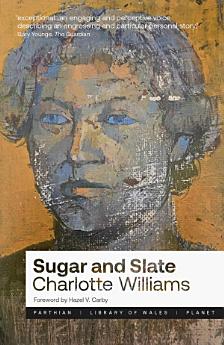Sugar and Slate
Charlotte Williams
ឧសភា 2023 · Parthian Books
សៀវភៅអេឡិចត្រូនិច
256
ទំព័រ
family_home
មានសិទ្ធិ
info
reportការវាយតម្លៃ និងមតិវាយតម្លៃមិនត្រូវបានផ្ទៀងផ្ទាត់ទេ ស្វែងយល់បន្ថែម
អំពីសៀវភៅអេឡិចត្រូនិកនេះ
'It is Williams's Welshness that makes the examination of her mixed-race identity distinctive, but it is the humour, candour and facility of her style that make it exceptional . . . an engaging and perceptive voice describing an engrossing and particular personal story.' – Gary Younge 'In its exploration of geographical, racial and cultural dislocation, Sugar and Slate is in the finest tradition of work to have emerged from the black diaspora in recent times.' – The Guardian 'Within this review, I can only scrape the surface of the many dimensions of Williams' memoir, so I strongly encourage you to read this precious book for yourself, and find those parts of it which speak most to you.' – Sarah Tanburn, Nation.Cymru 'Warmly recommended to any curious minds, at 20 years old Sugar And Slate still speaks to us in these modern times, helping to ensure marginal voices remain heard.' – Buzz A mixed-race young woman, the daughter of a white Welsh-speaking mother and black father from Guyana, grows up in a small town on the coast of north Wales. From there she travels to Africa, the Caribbean and finally back to Wales. Sugar and Slate is a story of movement and dislocation in which there is a constant pull of to-ing and fro-ing, going away and coming back with always a sense of being 'half home'. This is both a personal memoir and a story that speaks to the wider experience of mixed-race Britons. It is a story of Welshness and a story of Wales and above all a story for those of us who look over our shoulder across the sea to some other place. It would have been so much easier if I had been able to say, 'I come from Africa,' then maybe added under my breath, 'the long way round.' Instead, the Africa thing hung about me like a Welsh Not, a heavy encumbrance on my soul; a Not-identity; an awkward reminder of what I was or what I wasn't. Once at a seminar, one of those occasions when the word Diaspora crops up too many times and where there aren't too many of us present, the only other Diaspora-person sought me out. His eyes caught mine in recognition of something I can't say I could name, yet I must have responded because later as we chatted over fizzy water and conference packs, he offered quite uninvited and with all the authority of an African: 'People like you? You gotta get digging and if you dig deep enough you're gonna find Africa.'
អំពីអ្នកនិពន្ធ
Charlotte Williams OBE is a Welsh-Guyanese award-winning author, academic and cultural critic. Her writings span academic publications, memoir, short fiction, reviews, essays and commentaries. She is Emerita Professor at Bangor University and a member of the Learned Society of Wales. Her writings have taken her on travels worldwide but her heart and her home are always in Wales.
វាយតម្លៃសៀវភៅអេឡិចត្រូនិកនេះ
ប្រាប់យើងអំពីការយល់ឃើញរបស់អ្នក។
អានព័ត៌មាន
ទូរសព្ទឆ្លាតវៃ និងថេប្លេត
ដំឡើងកម្មវិធី Google Play Books សម្រាប់ Android និង iPad/iPhone ។ វាធ្វើសមកាលកម្មដោយស្វ័យប្រវត្តិជាមួយគណនីរបស់អ្នក និងអនុញ្ញាតឱ្យអ្នកអានពេលមានអ៊ីនធឺណិត ឬគ្មានអ៊ីនធឺណិតនៅគ្រប់ទីកន្លែង។
កុំព្យូទ័រយួរដៃ និងកុំព្យូទ័រ
អ្នកអាចស្ដាប់សៀវភៅជាសំឡេងដែលបានទិញនៅក្នុង Google Play ដោយប្រើកម្មវិធីរុករកតាមអ៊ីនធឺណិតក្នុងកុំព្យូទ័ររបស់អ្នក។
eReaders និងឧបករណ៍ផ្សេងទៀត
ដើម្បីអាននៅលើឧបករណ៍ e-ink ដូចជាឧបករណ៍អានសៀវភៅអេឡិចត្រូនិក Kobo អ្នកនឹងត្រូវទាញយកឯកសារ ហើយផ្ទេរវាទៅឧបករណ៍របស់អ្នក។ សូមអនុវត្តតាមការណែនាំលម្អិតរបស់មជ្ឈមណ្ឌលជំនួយ ដើម្បីផ្ទេរឯកសារទៅឧបករណ៍អានសៀវភៅអេឡិចត្រូនិកដែលស្គាល់។







